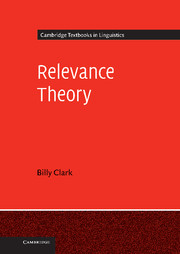Book contents
- Frontmatter
- Contents
- List of Figures and tables
- Preface
- Acknowledgements
- Typographical conventions
- Part I Overview
- 1 A first outline
- 2 Origins and alternatives: Grice, relevance theory and modern pragmatics
- 3 Principles of Relevance
- 4 Explaining inferences
- Part II Details and developments
- Appendix Key notions of relevance theory
- Notes to chapters
- Bibliography and other resources
- Index
3 - Principles of Relevance
from Part I - Overview
Published online by Cambridge University Press: 05 June 2013
- Frontmatter
- Contents
- List of Figures and tables
- Preface
- Acknowledgements
- Typographical conventions
- Part I Overview
- 1 A first outline
- 2 Origins and alternatives: Grice, relevance theory and modern pragmatics
- 3 Principles of Relevance
- 4 Explaining inferences
- Part II Details and developments
- Appendix Key notions of relevance theory
- Notes to chapters
- Bibliography and other resources
- Index
Summary
Topics: relevance, cognition and communication; relevance and effects; relevance and effort; the Cognitive Principle of Relevance; the Communicative Principle of Relevance; ostensive-inferential communication; relevance-guided comprehension heuristic
Overview
Having summarised relevance theory in Chapter 1 and looked at how it developed from the work of Grice in Chapter 2, this chapter presents more detail on the key notions proposed and used by relevance theory. We look at the general claims relevance theory makes about human cognition and communication and at the two Principles of Relevance: the First, or Cognitive, Principle of Relevance and the Second, or Communicative, Principle of Relevance. We look at how relevance is defined in terms of cognitive effects and processing effort, and then at how relevance theory defines the kind of communication which the Communicative Principle of Relevance applies to. This is termed ‘ostensive-inferential communication’ to reflect the fact that communicators communicate ostensively (openly showing an intention to communicate) and that audiences make inferences about the intentions of communicators. We then look at the ‘relevance-guided comprehension heuristic’ which addressees follow when interpreting utterances and other ostensively communicative acts. This is a ‘fast and frugal heuristic’ (a term used by Gigerenzer et al. 1999) which is motivated by the Communicative Principle of Relevance and the presumption of optimal relevance. Understanding the ideas in this chapter is essential in order to understand exactly how relevance theory aims to account for how we understand each other, which is the topic of Chapter 4. When you have finished the current chapter, you will have developed your understanding of the key components of relevance theory and be in a position to understand how they are applied in particular explanations and analyses. We will move on to look more closely at how relevance theory explains specific interpretations in Chapter 4.
- Type
- Chapter
- Information
- Relevance Theory , pp. 90 - 122Publisher: Cambridge University PressPrint publication year: 2013



